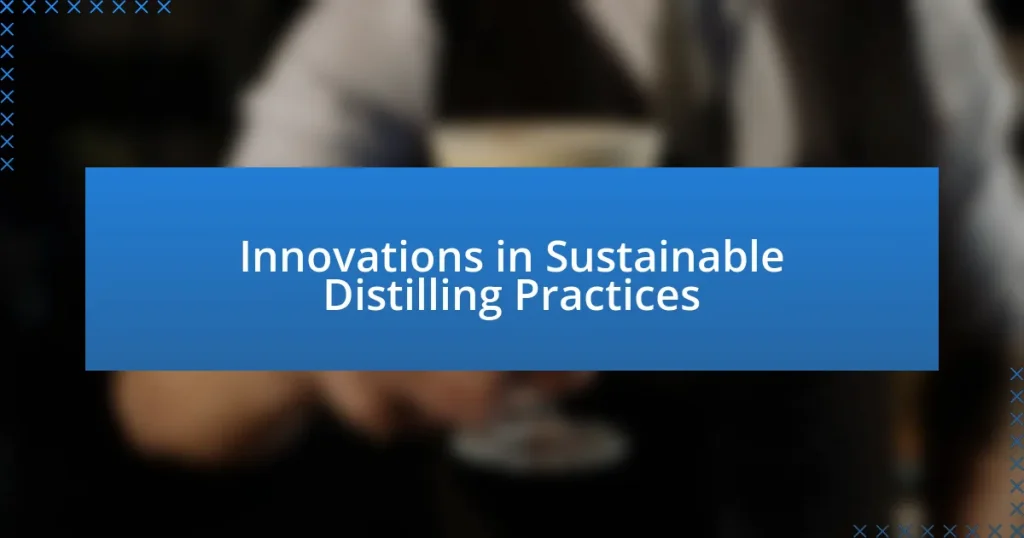Innovations in sustainable distilling practices focus on enhancing environmental responsibility within the distilling industry through the adoption of renewable energy sources, water conservation techniques, and waste reduction strategies. Key advancements include energy-efficient distillation technologies, such as heat recovery systems and bioreactors, which significantly lower energy consumption and carbon emissions. Additionally, practices like closed-loop water systems and the repurposing of by-products contribute to minimizing waste and promoting a circular economy. The article explores the impact of these innovations on operational efficiency, regulatory compliance, and consumer demand for eco-friendly products, while also addressing the challenges and future trends in sustainable distilling.
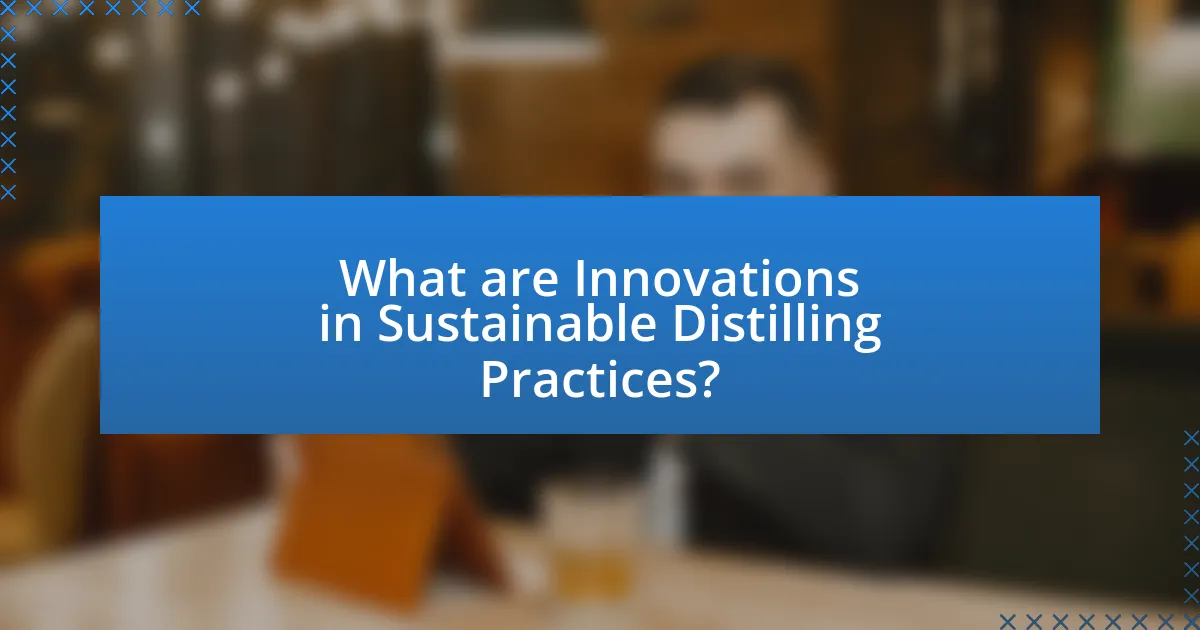
What are Innovations in Sustainable Distilling Practices?
Innovations in sustainable distilling practices include the use of renewable energy sources, water conservation techniques, and waste reduction strategies. Distilleries are increasingly adopting solar and wind energy to power their operations, significantly reducing their carbon footprint. For instance, some distilleries have implemented closed-loop water systems that recycle water used in the distillation process, minimizing water waste. Additionally, advancements in fermentation technology allow for the utilization of by-products, such as spent grains, to create biofuels or animal feed, thereby reducing overall waste. These practices not only enhance environmental sustainability but also improve operational efficiency and cost-effectiveness in the distilling industry.
How do these innovations impact the distilling industry?
Innovations in sustainable distilling practices significantly enhance the efficiency and environmental impact of the distilling industry. These advancements, such as energy-efficient distillation technologies and waste reduction methods, lead to lower energy consumption and reduced carbon footprints. For instance, the implementation of heat recovery systems can decrease energy use by up to 30%, while the adoption of bioreactors for waste treatment can minimize water usage and convert byproducts into valuable resources. Such innovations not only improve operational efficiency but also align the industry with increasing regulatory demands for sustainability, ultimately fostering a more responsible and economically viable distilling sector.
What are the key technologies driving these innovations?
The key technologies driving innovations in sustainable distilling practices include advanced fermentation techniques, energy-efficient distillation methods, and waste valorization technologies. Advanced fermentation techniques, such as using genetically modified yeast strains, enhance alcohol yield and reduce fermentation time, leading to lower resource consumption. Energy-efficient distillation methods, like vacuum distillation and heat recovery systems, minimize energy usage and carbon emissions during the distillation process. Waste valorization technologies convert by-products into valuable resources, such as biofuels or animal feed, thereby reducing waste and promoting circular economy principles. These technologies collectively contribute to more sustainable and environmentally friendly distilling practices.
How do these innovations contribute to environmental sustainability?
Innovations in sustainable distilling practices contribute to environmental sustainability by reducing energy consumption, minimizing waste, and utilizing renewable resources. For instance, the implementation of energy-efficient distillation technologies can decrease energy usage by up to 30%, significantly lowering carbon emissions associated with production. Additionally, practices such as water recycling and the use of by-products for bioenergy not only reduce waste but also promote a circular economy within the distilling industry. These advancements demonstrate a commitment to sustainability, as evidenced by the growing number of distilleries adopting such practices to meet environmental regulations and consumer demand for eco-friendly products.
Why is sustainability important in distilling practices?
Sustainability is important in distilling practices because it minimizes environmental impact and promotes resource efficiency. Distilling processes often consume significant amounts of water and energy, leading to waste and pollution. By adopting sustainable practices, distilleries can reduce their carbon footprint, conserve water, and utilize renewable energy sources. For instance, a study by the Distilled Spirits Council found that implementing sustainable practices can reduce water usage by up to 50% and energy consumption by 30%. This not only benefits the environment but also enhances the long-term viability of distilleries by aligning with consumer demand for eco-friendly products.
What are the environmental challenges faced by the distilling industry?
The distilling industry faces several environmental challenges, including high water consumption, energy-intensive processes, and waste management issues. Water usage is significant, with distilleries consuming large volumes for production and cooling, leading to potential water scarcity in some regions. Energy consumption is another critical challenge, as distillation requires substantial heat, often sourced from fossil fuels, contributing to greenhouse gas emissions. Additionally, the industry generates waste products, such as spent grains and by-products, which require effective disposal or recycling methods to minimize environmental impact. These challenges necessitate the adoption of sustainable practices to mitigate their effects on the environment.
How can sustainable practices mitigate these challenges?
Sustainable practices can mitigate challenges in distilling by reducing resource consumption and minimizing environmental impact. For instance, implementing energy-efficient technologies can decrease energy use by up to 30%, as demonstrated by distilleries that have adopted solar energy systems. Additionally, water conservation techniques, such as closed-loop systems, can reduce water usage by 50%, addressing water scarcity issues. Furthermore, utilizing local ingredients can lower transportation emissions and support local economies, enhancing sustainability. These practices not only address environmental concerns but also improve operational efficiency and economic viability in the distilling industry.
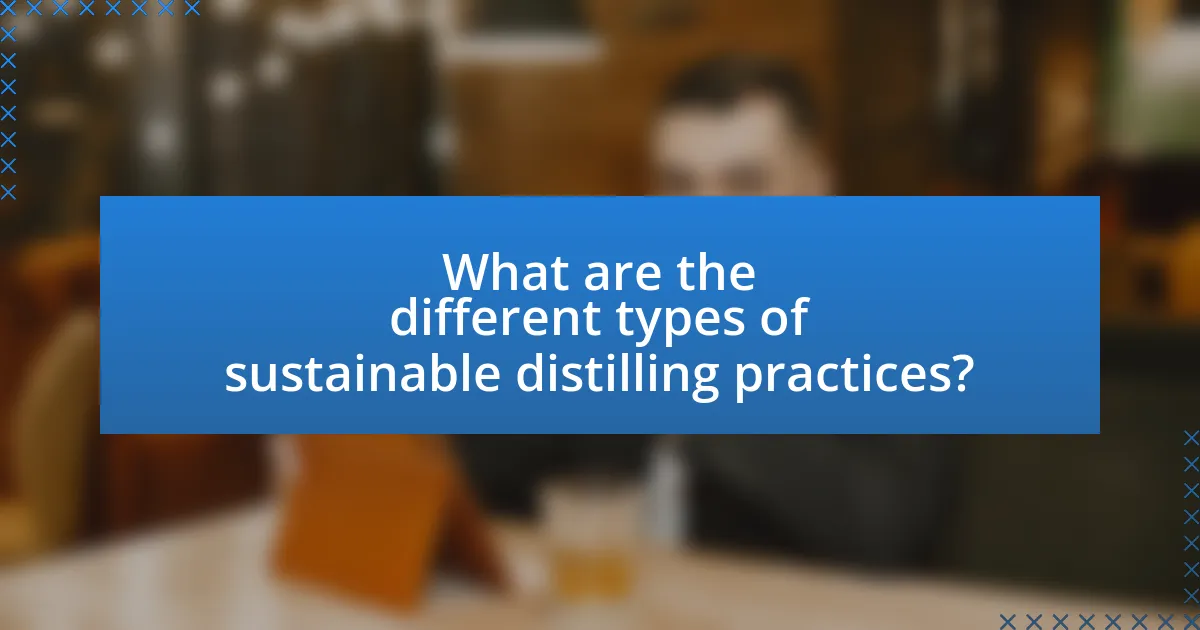
What are the different types of sustainable distilling practices?
Sustainable distilling practices include water conservation, energy efficiency, waste reduction, and sourcing local ingredients. Water conservation techniques involve using closed-loop systems to minimize water usage during production. Energy efficiency is achieved through the use of renewable energy sources, such as solar or wind power, to reduce carbon footprints. Waste reduction practices include repurposing byproducts, such as using spent grains for animal feed or composting. Sourcing local ingredients supports local economies and reduces transportation emissions, contributing to overall sustainability in the distilling process.
How do renewable energy sources play a role in distilling?
Renewable energy sources significantly enhance the distilling process by providing sustainable power for heating and cooling, which are critical in distillation. For instance, solar thermal energy can be harnessed to heat distillation units, reducing reliance on fossil fuels and lowering greenhouse gas emissions. Additionally, biomass energy can be utilized to generate steam for distillation, further promoting sustainability in the industry. According to a study published in the journal “Renewable Energy,” the integration of renewable energy in distilling can lead to a reduction of up to 30% in energy costs and a substantial decrease in carbon footprint, demonstrating the effectiveness of these energy sources in improving the environmental impact of distilling practices.
What types of renewable energy are most commonly used?
The most commonly used types of renewable energy are solar energy, wind energy, hydroelectric power, biomass, and geothermal energy. Solar energy harnesses sunlight through photovoltaic cells, while wind energy captures kinetic energy from wind using turbines. Hydroelectric power generates electricity by utilizing flowing water, typically from rivers or dams. Biomass energy is derived from organic materials, such as plant and animal waste, which can be converted into fuel. Geothermal energy taps into heat from the Earth’s interior for heating and electricity generation. These renewable energy sources are increasingly adopted due to their sustainability and lower environmental impact compared to fossil fuels.
How does the use of renewable energy affect production costs?
The use of renewable energy generally reduces production costs in sustainable distilling practices. By utilizing sources such as solar, wind, or biomass, distilleries can lower their reliance on fossil fuels, which are subject to price volatility. For instance, a study by the International Renewable Energy Agency (IRENA) found that transitioning to renewable energy can lead to a reduction in energy costs by up to 30% over time due to decreased fuel expenses and potential government incentives. Additionally, renewable energy systems often have lower operational costs once installed, as they require less maintenance compared to traditional energy sources. This shift not only enhances cost efficiency but also aligns with environmental sustainability goals, making it a financially viable option for distilleries.
What role does water conservation play in sustainable distilling?
Water conservation is crucial in sustainable distilling as it minimizes resource depletion and reduces environmental impact. Distilling processes typically require significant amounts of water for cooling, cleaning, and fermentation. By implementing water-saving technologies and practices, distilleries can lower their water usage, thereby conserving this vital resource. For instance, some distilleries have adopted closed-loop systems that recycle water, significantly decreasing their overall consumption. According to a study by the Distilled Spirits Council, distilleries that implement water conservation measures can reduce water usage by up to 50%, demonstrating the effectiveness of these innovations in promoting sustainability within the industry.
What techniques are used to reduce water usage in distilling?
Techniques used to reduce water usage in distilling include closed-loop systems, heat recovery, and the use of alternative cooling methods. Closed-loop systems recycle water within the distillation process, minimizing the need for fresh water intake. Heat recovery systems capture and reuse heat generated during distillation, which reduces the energy and water required for cooling. Additionally, alternative cooling methods, such as air cooling or using non-potable water sources, further decrease overall water consumption. These methods collectively contribute to more sustainable distilling practices by significantly lowering water usage.
How does water conservation impact the quality of the final product?
Water conservation significantly enhances the quality of the final product in distilling by ensuring optimal ingredient purity and reducing contamination risks. When water usage is minimized, the distillation process can maintain a consistent temperature and pressure, which are critical for achieving desired flavor profiles and aromas. Additionally, studies indicate that excessive water can dilute essential oils and flavors, leading to a less concentrated and inferior product. For instance, research published in the Journal of Agricultural and Food Chemistry highlights that lower water usage in the distillation of essential oils results in higher yield and potency, confirming that water conservation directly correlates with improved product quality.
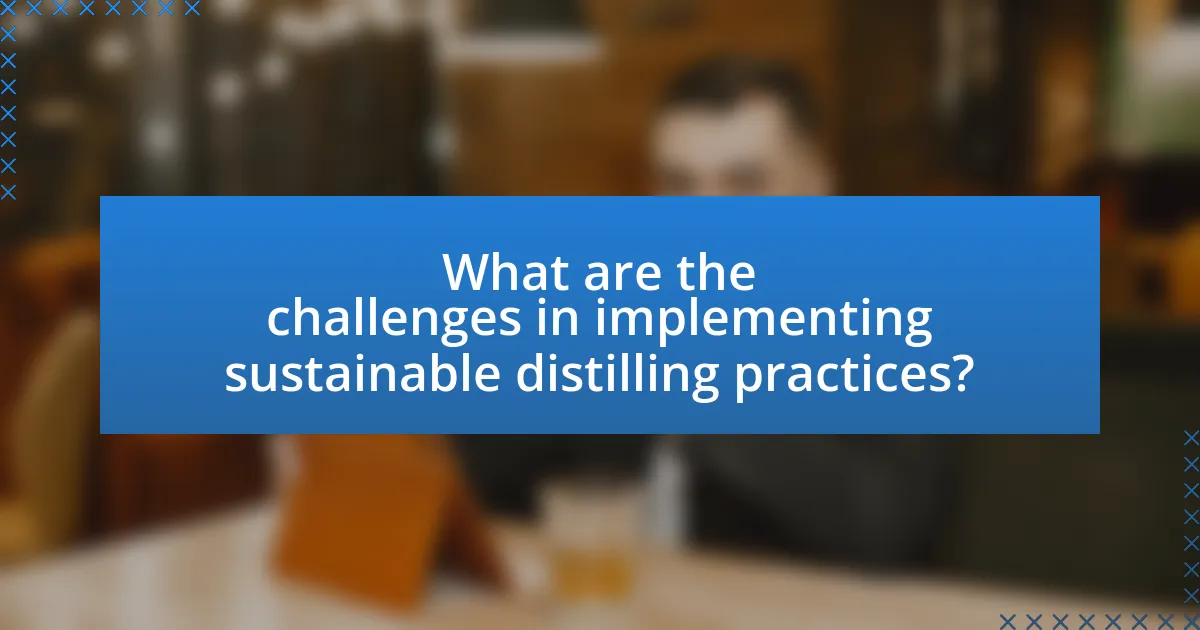
What are the challenges in implementing sustainable distilling practices?
The challenges in implementing sustainable distilling practices include high initial costs, regulatory complexities, and limited access to sustainable raw materials. High initial costs arise from the investment required for new technologies and equipment that reduce environmental impact, such as energy-efficient stills and waste management systems. Regulatory complexities can hinder the adoption of sustainable practices, as distillers must navigate varying local, national, and international regulations regarding production methods and environmental standards. Additionally, limited access to sustainable raw materials, such as organic grains or environmentally friendly botanicals, can restrict distillers’ ability to produce sustainably, impacting their supply chains and overall production capabilities.
What are the economic barriers to adopting sustainable technologies?
The economic barriers to adopting sustainable technologies include high initial investment costs, lack of financial incentives, and uncertain return on investment. High initial costs deter businesses from transitioning to sustainable technologies, as they often require significant capital for new equipment and infrastructure. Additionally, the absence of government subsidies or tax breaks limits financial support, making it challenging for companies to justify the switch. Uncertainty regarding the long-term financial benefits of sustainable technologies further complicates decision-making, as businesses may hesitate to invest without clear evidence of profitability. For instance, a study by the International Renewable Energy Agency found that upfront costs can be a major deterrent, with 70% of companies citing financial constraints as a key barrier to adopting renewable energy solutions.
How can distilleries overcome these economic challenges?
Distilleries can overcome economic challenges by adopting innovative sustainable practices that reduce costs and enhance efficiency. Implementing energy-efficient technologies, such as heat recovery systems, can significantly lower operational expenses. For instance, a study by the Distilled Spirits Council found that distilleries utilizing such technologies can reduce energy consumption by up to 30%. Additionally, sourcing local ingredients can minimize transportation costs and support local economies, further improving financial resilience. By embracing these sustainable innovations, distilleries not only address economic challenges but also align with growing consumer demand for environmentally responsible products.
What financial incentives are available for sustainable practices?
Financial incentives for sustainable practices include tax credits, grants, and low-interest loans specifically designed to encourage environmentally friendly initiatives. For example, the U.S. federal government offers the Investment Tax Credit (ITC) for renewable energy projects, which allows businesses to deduct a significant percentage of the cost of solar energy systems from their federal taxes. Additionally, various state and local governments provide grants and rebates for energy efficiency upgrades and sustainable agricultural practices, which can significantly reduce upfront costs. According to the Database of State Incentives for Renewables & Efficiency (DSIRE), over 2,000 financial incentives exist across the United States, promoting investments in sustainable technologies and practices.
How do regulatory frameworks influence sustainable distilling?
Regulatory frameworks significantly influence sustainable distilling by establishing guidelines that promote environmentally friendly practices and resource efficiency. These regulations often mandate the reduction of waste, emissions, and energy consumption, compelling distilleries to adopt innovative technologies and processes. For instance, the European Union’s regulations on distillation by-products encourage the use of waste materials for energy production, thereby minimizing environmental impact. Additionally, compliance with sustainability certifications, such as ISO 14001, incentivizes distilleries to implement best practices in waste management and resource conservation, ultimately leading to a more sustainable industry.
What regulations currently exist regarding sustainability in distilling?
Regulations regarding sustainability in distilling primarily include the European Union’s Green Deal, which aims to make Europe climate-neutral by 2050, impacting distilleries through stricter emissions and waste management standards. Additionally, the U.S. Environmental Protection Agency enforces regulations under the Clean Air Act and the Clean Water Act, which require distilleries to manage their emissions and wastewater effectively. These regulations are designed to promote sustainable practices by limiting environmental impact, encouraging energy efficiency, and mandating the use of renewable resources in production processes.
How can distilleries navigate these regulations effectively?
Distilleries can navigate regulations effectively by implementing comprehensive compliance programs that include regular training, audits, and updates on legal requirements. These programs ensure that staff are well-informed about local, state, and federal regulations governing distillation processes, labeling, and environmental practices. For instance, the Alcohol and Tobacco Tax and Trade Bureau (TTB) provides guidelines that distilleries must follow, and staying updated with these regulations can prevent costly fines and operational disruptions. Additionally, engaging with industry associations can provide distilleries with resources and support to better understand and comply with evolving regulations.
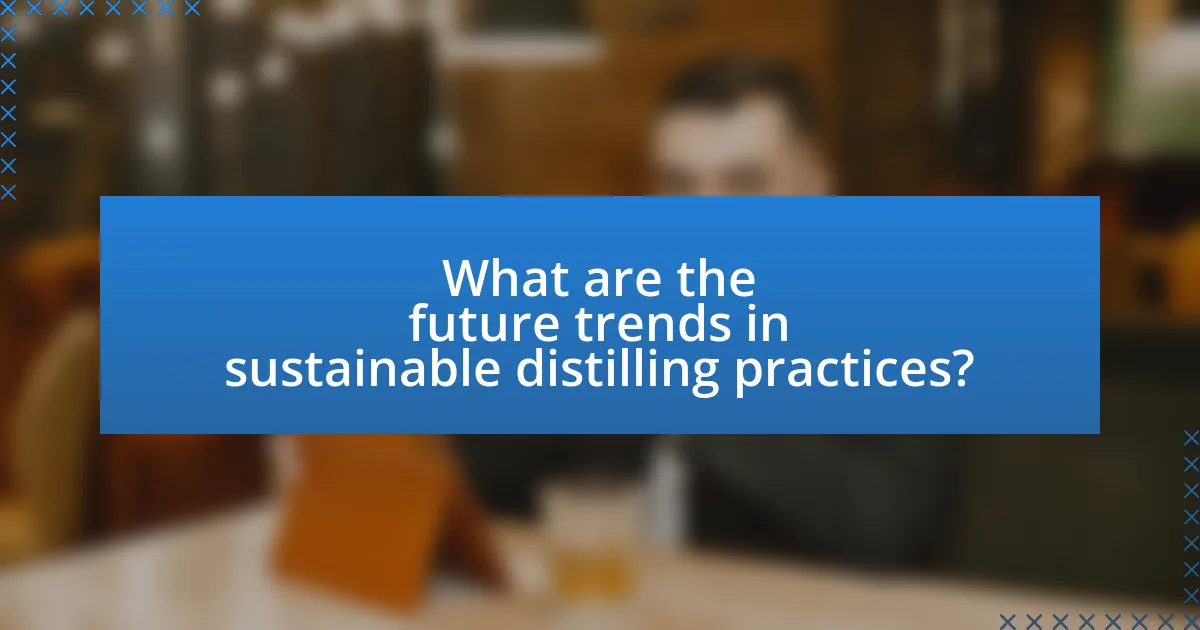
What are the future trends in sustainable distilling practices?
Future trends in sustainable distilling practices include the increased use of renewable energy sources, water conservation techniques, and innovative waste management systems. Distilleries are adopting solar and wind energy to power their operations, significantly reducing their carbon footprint. For instance, a study by the Distilled Spirits Council indicates that distilleries using renewable energy can cut greenhouse gas emissions by up to 50%. Additionally, advanced water recycling systems are being implemented to minimize water usage, with some distilleries achieving a reduction of over 30% in water consumption. Furthermore, the adoption of circular economy principles is gaining traction, where by-products from distillation are repurposed for other industries, enhancing resource efficiency. These trends reflect a growing commitment to environmental stewardship within the distilling industry.
How is consumer demand shaping sustainable distilling innovations?
Consumer demand is driving sustainable distilling innovations by prioritizing eco-friendly practices and transparency in production. Distillers are responding to this shift by adopting renewable energy sources, reducing water usage, and utilizing sustainable ingredients. For instance, a survey by the Beverage Marketing Corporation indicated that 66% of consumers prefer brands that demonstrate environmental responsibility. This consumer preference is prompting distilleries to implement innovative technologies, such as carbon capture and waste recycling systems, to meet market expectations and enhance brand loyalty.
What products are gaining popularity due to sustainable practices?
Products gaining popularity due to sustainable practices include organic spirits, eco-friendly packaging, and locally sourced ingredients. Organic spirits are produced without synthetic pesticides or fertilizers, appealing to health-conscious consumers and those concerned about environmental impact. Eco-friendly packaging, such as biodegradable or recyclable materials, reduces waste and attracts environmentally aware buyers. Additionally, the use of locally sourced ingredients supports local economies and minimizes carbon footprints, making these products more attractive to consumers who prioritize sustainability. The rise in demand for these products is evidenced by a 2021 report from the Distilled Spirits Council, which noted a significant increase in sales of organic spirits, reflecting a broader trend towards sustainability in the beverage industry.
How can distilleries adapt to changing consumer preferences?
Distilleries can adapt to changing consumer preferences by implementing innovative sustainable practices that align with consumer values. For instance, many consumers are increasingly prioritizing environmentally friendly products, prompting distilleries to adopt organic ingredients and reduce waste through circular economy practices. A study by the Beverage Marketing Corporation indicates that 66% of consumers are willing to pay more for sustainable brands, highlighting the market demand for such adaptations. Additionally, distilleries can engage in transparent sourcing and production processes, which resonate with consumers seeking authenticity and ethical consumption. By embracing these strategies, distilleries not only meet evolving consumer expectations but also enhance their market competitiveness.
What role does research and development play in future innovations?
Research and development (R&D) is crucial for driving future innovations, particularly in sustainable distilling practices. R&D enables the exploration of new technologies and methodologies that enhance efficiency and reduce environmental impact in distillation processes. For instance, advancements in bioreactor design and fermentation techniques can lead to more sustainable production methods, as evidenced by studies showing that optimized fermentation can reduce energy consumption by up to 30%. Furthermore, R&D fosters collaboration between academia and industry, facilitating the transfer of knowledge and innovative solutions that address sustainability challenges in distilling. This collaborative approach has been instrumental in developing eco-friendly distillation technologies, such as low-energy distillation systems, which are gaining traction in the industry.
What are the emerging technologies in sustainable distilling?
Emerging technologies in sustainable distilling include advanced fermentation techniques, energy-efficient distillation processes, and waste valorization methods. Advanced fermentation techniques, such as using genetically modified yeast strains, enhance alcohol yield while reducing resource consumption. Energy-efficient distillation processes, like vacuum distillation and heat recovery systems, minimize energy usage and lower carbon footprints. Waste valorization methods, including the conversion of by-products into biofuels or animal feed, contribute to a circular economy in distilling. These technologies collectively support sustainability goals by optimizing resource use and reducing environmental impact.
How can collaboration among distilleries enhance innovation?
Collaboration among distilleries can enhance innovation by facilitating the sharing of knowledge, resources, and technologies. When distilleries work together, they can combine their expertise to develop new sustainable practices, such as eco-friendly production methods or waste reduction techniques. For instance, joint research initiatives can lead to breakthroughs in fermentation processes that minimize environmental impact. Additionally, collaborative projects can result in the pooling of financial resources, enabling distilleries to invest in advanced technologies that might be too costly for a single entity. This collaborative approach has been evidenced by partnerships in the industry that have successfully launched innovative products, demonstrating that collective efforts can drive significant advancements in sustainable distilling practices.
What best practices can distilleries adopt for sustainability?
Distilleries can adopt several best practices for sustainability, including implementing energy-efficient technologies, utilizing renewable energy sources, and optimizing water usage. Energy-efficient technologies, such as heat recovery systems, can reduce energy consumption by up to 30%, while renewable energy sources like solar or wind power can significantly lower carbon footprints. Additionally, optimizing water usage through closed-loop systems can minimize water waste, with some distilleries achieving reductions of over 50% in water consumption. These practices not only enhance environmental responsibility but also improve operational efficiency and reduce costs.
